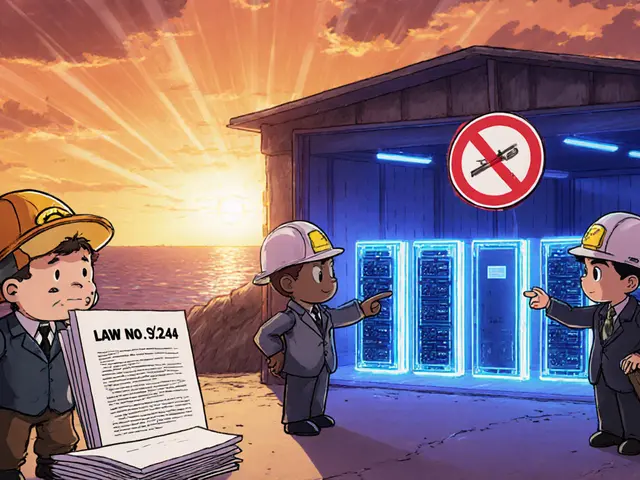Angola Crypto Mining Law Impact Calculator
Legal Risk Assessment
Quick Summary
- Law No.3/24 took effect on April102024, outlawing all cryptocurrency mining in Angola.
- Penalties range from one to twelve years in prison, plus confiscation of equipment.
- The ban targets the energy‑hungry Bitcoin farms that strained the national grid.
- Interpol helped dismantle 25 illegal mining sites in August2024, seizing $37million worth of gear.
- Foreign miners, especially Chinese nationals, face expulsion and a travel ban.
When you hear the phrase Angola crypto mining ban, the first thing to understand is that the country went from being Africa’s biggest Bitcoin mining hub to a zero‑tolerance zone in less than a year. Below we unpack why the law was introduced, what it actually bans, how it’s being enforced, and what the ripple effects are for miners worldwide.
Angola is a west‑central African nation with about 39million residents. Its economy leans heavily on oil, but after China’s 2021 crypto crackdown, a wave of Chinese operators moved their Bitcoin farms to Angola’s cheap, diesel‑heavy power grid. By Q42023, Angola ranked eighth globally in Bitcoin hash rate, eclipsing many traditional mining centers.
How Angola Became a Bitcoin Magnet
The migration started in December2021 when Chinese mining companies, squeezed by the domestic ban, looked for locations with low electricity costs and lax regulation. Angola offered just that: abundant hydro‑electric potential, a relatively uncapped power market, and a welcoming stance toward foreign investment.
Within two years, hundreds of farms-some the size of small warehouses-sprouted along the coastal province of Luanda. The combined load of these operations strained an already fragile grid, leading to rolling blackouts for households and businesses.
Energy‑related complaints grew louder, and by early 2024 the Angolan Ministry of Energy released a report linking Bitcoin mining to a 15% spike in national electricity consumption during peak hours.
Law No.3/24: What Exactly Is Prohibited?
Law No.3/24 (Legal Framework for the Prohibition of Cryptocurrency Mining and Other Virtual Assets) was published in March2024 and became enforceable on April102024. The legislation defines cryptocurrency mining as “the process of generating, validating, and including new transactions in a blockchain by solving cryptographic puzzles.” It bans three core activities:
- Any mining of cryptocurrencies or other virtual assets within Angola’s territory.
- Use of licensed electrical installations for mining purposes.
- Connecting mining equipment to the National Electrical System for the same purpose.
The law also criminalizes mere possession of mining hardware, software, or related infrastructure, even if the equipment is idle.
Penalties: From Fines to Prison
Interpol coordinated a large‑scale raid in August2024 that highlighted how seriously Angola will enforce these provisions. Penalties are severe:
| Offense | Imprisonment | Additional Sanctions |
|---|---|---|
| Operating a mining farm | 1-12 years | Asset confiscation, ban from public office |
| Possessing mining hardware | 1-5 years | Confiscation of equipment |
| Foreign national involvement | 1-12 years | Expulsion from Angola, travel ban |
Legal persons (companies) face fines equivalent to up to 10% of annual revenue, though a drafting error in article numbering has left some ambiguity that lawyers are still sorting out.

Energy Security: The Real Driver Behind the Ban
Angola’s power grid has long struggled with distribution losses and intermittent supply. The sudden surge in electricity demand from Bitcoin farms pushed the system past its safe operating limits. Rural villages reported daily outages, factories slowed down, and hospitals faced generator overloads.
Government officials framed the ban as a protective measure for “essential services and residents,” emphasizing that the country cannot afford to sacrifice basic electricity for speculative mining profits. The same energy‑security narrative was echoed in statements from the Ministry of Energy and the national utility company, Empresa Nacional de Energia (ENDE).
International Crackdown: The August2024 Interpol Operation
In August2024, Interpol partnered with Angolan police in a coordinated operation that shut down 25 illegal mining sites operated by roughly 60 Chinese nationals.
The raid seized over 300 ASIC miners, power converters, and related networking gear, valued at more than $37million. Angola announced that the confiscated equipment would be redistributed to underserved regions as part of a social‑support program.
At the same time, a broader cyber‑crime sweep across several African nations resulted in 1,209 arrests and the recovery of $97million in illicit proceeds, underscoring the global urgency to curb crypto‑related crimes.
Impact on Miners and the Global Bitcoin Network
For miners, the ban translates into immediate shutdown costs, potential imprisonment, and the loss of thousands of dollars in equipment. Many Chinese operators, who had invested heavily in Angola’s cheap power, are now scrambling to relocate to more crypto‑friendly jurisdictions such as Kazakhstan or Serbia.
On the network level, Angola’s hash rate contribution-once about 6% of global Bitcoin mining-plummeted after April2024. The hash‑rate drop was temporarily offset by a surge in miners shifting to other African countries like Nigeria and Ghana, but the overall decentralization benefit remains modest.
Investors monitoring Bitcoin’s environmental impact see the ban as a positive signal that governments can intervene when mining becomes unsustainable for national infrastructure.
What to Watch Next
Even though mining is outlawed, Angola has not banned all digital‑asset activities. Trading platforms and wallet services can still operate, provided they do not involve mining. Future legislative tweaks may clarify the status of proof‑of‑stake (PoS) projects, which consume far less electricity.
Analysts anticipate two possible scenarios:
- Strict enforcement continues: More raids, tighter customs checks on imported ASIC hardware, and harsher penalties for repeat offenders.
- Regulatory pivot: Angola could introduce a licensing scheme for low‑energy mining or encourage renewable‑energy‑powered farms to regain some revenue without jeopardizing the grid.
Watch for updates from the Angolan Ministry of Justice and announcements from the African Union’s digital‑economy task force, both of which will shape the next chapter of crypto policy on the continent.
Frequently Asked Questions
Is owning a Bitcoin wallet illegal in Angola?
No. Law No.3/24 only targets mining activities and the related infrastructure. Holding, sending, or receiving cryptocurrencies remains legal.
What happens if I have idle ASIC miners in my garage?
Even idle equipment can be considered prohibited if it’s capable of mining. The law permits confiscation and a prison term of one to five years for possession.
Can foreign companies apply for an exemption?
The current legislation allows no exemptions for mining. Any request would need to be approved by the Ministry of Justice, which has so far indicated a zero‑tolerance stance.
Will the ban affect Angola’s overall crypto industry?
Trading, token issuance, and blockchain development can still thrive. The ban is narrowly focused on energy‑intensive mining, so other crypto services are expected to continue growing.
How can I verify if a piece of equipment is considered mining hardware?
ASIC miners, GPU rigs designed for proof‑of‑work, and any software that can solve blockchain hash puzzles fall under the definition. If the device’s primary purpose is to generate new blocks, it is prohibited.







Sidharth Praveen
May 24, 2025 AT 20:27Angola's crackdown is a wake‑up call for anyone thinking they can run energy‑hungry farms anywhere without facing local backlash. The penalties are harsh, but they reflect genuine strain on the grid.
Sophie Sturdevant
May 25, 2025 AT 04:47From a compliance standpoint, the legal definition of "mining" now encompasses any ASIC, GPU rig, or even dormant hardware capable of PoW. Operators must conduct a thorough risk assessment to avoid inadvertent violations that could trigger confiscation and multi‑year imprisonment.
katie littlewood
May 25, 2025 AT 13:07Considering the broader macro‑economic context, the Angolan decision aligns with a global trend where governments are increasingly scrutinizing the externalities of proof‑of‑work mining. First, the energy consumption of Bitcoin farms often eclipses that of entire small nations, creating a tangible burden on already fragile power infrastructures. Second, the environmental narrative, while sometimes overstated, does have merit in regions dependent on diesel generation, as is the case for many of Angola's provinces. Third, the influx of foreign capital, particularly from Chinese operators, introduced a rapid escalation of demand that outpaced any incremental upgrades to the national grid. Fourth, the social contract between the state and its citizens dictates that reliable electricity for hospitals, schools, and households takes precedence over speculative digital asset extraction. Fifth, the legal framework, by criminalizing even the possession of idle mining equipment, signals a zero‑tolerance policy that extends beyond mere operational farms. Sixth, the Interpol‑coordinated raids underscore the international dimension of enforcement, indicating that cross‑border cooperation will become a staple in crypto regulation. Seventh, the penalties-ranging from one to twelve years imprisonment-reflect a calibrated response aimed at deterring both large‑scale operators and solitary hobbyists. Eighth, the confiscated hardware being repurposed for underserved regions could mitigate some of the social loss, though it does little to compensate miners for sunk costs. Ninth, the ripple effect on the global hash‑rate distribution is evident; a sudden 6% drop from Angola created a temporary vacuum that other African hubs attempted to fill. Tenth, the potential pivot toward renewable‑powered mining, should Angola's legislature relax its stance, could re‑introduce the country as a low‑cost hub while preserving grid stability. Eleventh, miners worldwide must now factor in geopolitical risk as a key variable in their business models. Twelfth, policy analysts predict that similar bans may emerge in other resource‑constrained nations, further fragmenting the mining ecosystem. Thirteenth, investors focused on environmental, social, and governance (ESG) criteria will likely view Angola's move as a positive step toward responsible crypto deployment. Fourteenth, the ongoing legal ambiguity surrounding corporate fines creates an engineering challenge for compliance teams seeking precise cost calculations. Finally, the situation serves as a case study for how rapid regulatory shifts can reshape the geography of decentralized finance, compelling stakeholders to stay agile and continuously monitor legislative developments.
Jenae Lawler
May 25, 2025 AT 21:27It is, however, an overstatement to proclaim this ban as a triumph of regulatory foresight; the legislation suffers from ambiguous drafting, particularly concerning corporate liability, and may inadvertently stifle legitimate blockchain innovation unrelated to proof‑of‑work.
Chad Fraser
May 26, 2025 AT 05:47Exactly, the ban opens a window for those of us who are still passionate about crypto to explore greener alternatives. Maybe Angola can pilot solar‑powered mining zones with strict caps to keep the grid safe.
Jayne McCann
May 26, 2025 AT 14:07This is just government overreach.
Richard Herman
May 26, 2025 AT 22:27While the sentiment is understandable, we should also recognize the legitimate concerns about electricity scarcity. Collaborative dialogue between miners and policymakers could produce balanced solutions.
Parker Dixon
May 27, 2025 AT 06:47Great breakdown! 👍 For anyone still holding gear, consider relocating or selling quickly to avoid the upcoming crackdown. 🚀
celester Johnson
May 27, 2025 AT 15:07One might argue that the moral calculus behind imprisoning individuals for owning a piece of hardware borders on the absurd, yet the state’s prerogative to secure essential services supersedes personal liberty in this context.
Prince Chaudhary
May 27, 2025 AT 23:27Friends, remember to keep your statements factual and avoid emotive language when discussing legal matters. The law is clear: possession equals offense.
John Kinh
May 28, 2025 AT 07:47Honestly, this whole thing is just hype. Miners will find another spot, and Angola will lose out on potential revenue. 🙄
Mark Camden
May 28, 2025 AT 16:07From an ethical standpoint, imposing draconian sentences for the mere ownership of computational devices raises profound questions about proportionality and justice.
Evie View
May 29, 2025 AT 00:27Stop glorifying crypto mining; it's a zero‑sum game that only benefits a handful while draining national resources.
Nathan Blades
May 29, 2025 AT 08:47Let's keep the momentum positive-if Angola revisits its policy, we could champion a model where mining is powered exclusively by renewables, turning a liability into an asset for the nation.
Somesh Nikam
May 29, 2025 AT 17:07For those still uncertain, consult a legal expert familiar with Angolan statutes before making any equipment moves. Precise compliance can save you years of hardship.
Jan B.
May 30, 2025 AT 01:27Nice summary. The ban is clear; miners should look elsewhere.
MARLIN RIVERA
May 30, 2025 AT 09:47The data shows a direct correlation between mining density and grid instability; therefore, the regulatory response is justified.
Debby Haime
May 30, 2025 AT 18:07Even though the ban feels harsh, it could be an opportunity for Angola to develop a tech‑focused economy that doesn't rely on energy‑intensive activities.
emmanuel omari
May 31, 2025 AT 02:27Our nation cannot allow foreign entities to siphon power for profit while citizens suffer blackouts. This law protects national sovereignty.
Andy Cox
May 31, 2025 AT 10:47Interesting how quickly the policy shifted after the Interpol raid. It shows the power of international cooperation.
Courtney Winq-Microblading
May 31, 2025 AT 19:07One might view the ban as an artistic statement on the limits of techno‑utopianism, exposing the tension between digital ambition and terrestrial realities.
Stefano Benny
June 1, 2025 AT 03:27Sure, the ban is heavy, but think about the future where miners compete for green energy credits. That's where the real profit lies. 😎
Bobby Ferew
June 1, 2025 AT 11:47Honestly, the whole crypto hype is just a bubble. Regulations like these are inevitable.
Amie Wilensky
June 1, 2025 AT 20:07Reading through the legislation, one cannot help but notice the overlapping articles-this could create loopholes that crafty operators might exploit; however, the government's enforcement track record suggests that they will not tolerate such attempts, indicating a possible need for a legislative overhaul to remove ambiguities and strengthen the legal scaffold against any potential circumvention tactics.
MD Razu
June 2, 2025 AT 04:27In the grand tapestry of regulatory evolution, Angola's decisive action emerges as a pivotal thread that intertwines sovereignty, resource stewardship, and the inexorable march of technological decentralization; the juxtaposition of punitive measures against a backdrop of global energy concerns invites a nuanced discourse that balances the moral imperative to protect citizens' access to electricity with the entrepreneurial spirit that fuels blockchain innovation; moreover, the reverberations of this policy will likely cascade across jurisdictions, prompting a reevaluation of the cost‑benefit calculus inherent in hosting energy‑intensive operations within fragile grids, thereby catalyzing a shift toward more sustainable, low‑energy consensus mechanisms and perhaps even inspiring a renaissance of renewable‑backed mining ecosystems that harmonize economic opportunity with environmental responsibility.